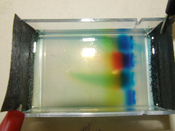Genetic engineering has developed and blossomed at a frightening rate in the last decade. Originating as merely an area of interest for scientists, genetic engineering has now become an area of which all people should be somewhat knowledgeable.
DNA profiling has many uses, both positive and negative, in our society. Aside from its usefulness in many legal investigations, DNA profiling can be used in the workplace to discriminate against employees whose profiles could pose a financial risk. For example, genetic technology can and has been used to determine the capacity of a person to contract certain diseases, such as sickle-cell anemia, which could cause many employers to hesitate in the hiring and training of such people. In the early 1970's, the United States began a carrier screening for sickle-cell anemia, which affects 1 in 400 African-Americans. Many of those identified as carriers mistakenly thought they were afflicted with this debilitating disease.
Furthermore, confidentiality was often breached, and in some cases, carriers were discriminated against and denied health insurance.
Nevertheless, genetic profiling has been beneficial in paternity suits and rape cases, where the father or the assailant could be identified. However, despite its growing number of utilizations, DNA profiling is extremely hazardous when results are inaccurate or used to discriminate.
The frequency of genetic testing in criminal investigations (more than 1,000 in the U.S. since 1987) has been increasing dramatically despite the inconclusive testing by the scientific community in many aspects of forensic identification. A correlation between DNA patterns taken from a crime scene and taken from the suspect has often been enough to charge a person with the offense in spite of proof that some procedures for testing DNA are fallible by legal and scientific standards.
The complexity of scientific evidence, especially DNA profiling, has also caused many problems...


